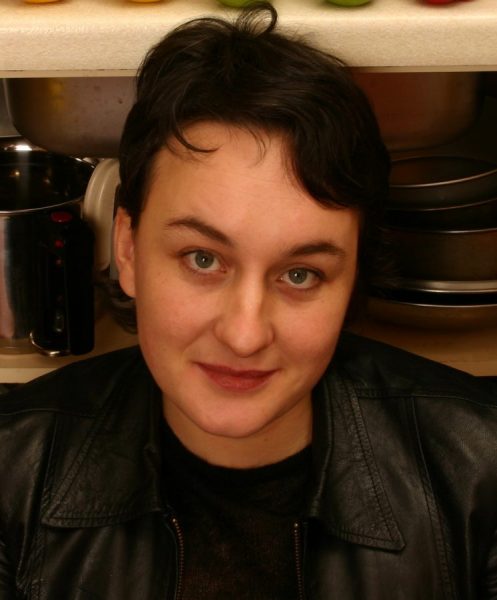ANA: Showing @ Traverse Theatre, Edinburgh, Thu 1 – Sat 10 Mar
Playwright Clare Duffy talks to Emma Hay about ANA which she co-wrote with Pierre Yves Lemieux: a co-production between Stellar Quines and Quebec’s Imago Theatre.
Tell us a bit about ANA…
The inspiration came from Muriel Romanes (Artistic Director, Stellar Quines) and Clare Schapiro (Artistic Director, Imago Theatre) who wanted to produce a play about women, exploring madness and depression. Initially, they asked me to contribute with workshops and script. During this time, I became interested in the idea that it could be a character who split – not psychologically, but an actual divide. When the moment comes in which she has to make a big decision, she would split, she would be able to appear on both sides. This opened up the opportunity for another writer to create something totally different. It was also a way of including madness – not in the schizophrenic sense, but more the depression and anxiety of being somewhere and not understanding where it is you’ve found yourself. It’s certainly ambitious, but it all comes together as a rich combination of different women. The idea is that she represents that sense of dizziness and reproduction, for example, looking at a reflection of a reflection of a reflection and so on. It can be exhilarating, but also scary and we sometimes identify that with madness.
The goddess Inanna – who comes from Sumerian myth – embodies womankind through the ages as she descends to the Underworld. She has become a strong feminist figure. Why do you think she resonates so strongly now?
I guess there is an underlying metaphor for descent into madness and death: Inanna represented the cyclical nature of the moon which itself is related to the idea of madness, progression into new knowledge or another kind of life. She is a character from a story that originated over 5,000 years ago, from the very first story that we know of. It’s still interesting because the notion of creativity – what it does for us, for the world, the fear of taking a risk – is still ingrained in us now. Ana is scared to go to the Underworld, but she does it anyway because she has to. We all have to do things we don’t like.
Ana is a bilingual production: will this piece be problematic for those who don’t speak French/Quebecois? If not, why?
I hope it won’t be! Most of it is subtitled. Depending on what language you understand. People may not understand exact responses themselves, but understand what they mean by the way they are reacted to; the context is important. For instance, you might not pick up “I love you”, but if someone says “I love you too” back, then it should all make sense.
The atmosphere of a play is mostly generated through the different languages
The play is being staged by a male director, Serge Denoncourt. What do you think he brings to the piece that might not have existed without him?
I don’t know if I can comment on this – I suppose there’s a strand of feminist thinking that wants to analyse how gender might affect the interpretation and presentation of a script, but I think it’s dependent on the individual themselves. What Serge brings as Serge is probably more than what he would bring to Ana as a man; he has an incredible visual sense, he creates really powerful images.
This play is about – among other things – breaking barriers between languages. Is the characterisation of ANA, and the other women, dependent on language?
I think that’s partly a question of translation. Different characters have made certain decisions because that’s what we (as writers) think they would do. That’s a big task for the translator. It’s very difficult for them to know exactly what we were thinking and that usually means changes. It’ll never be exactly the same, but maybe that’s exciting when you’re talking about a character who splits. The atmosphere of a play is mostly generated through the different languages giving it, as a whole, texture, rather than the character.
Scottish theatre is incredibly outward looking
You are running a workshop at the Traverse in March: “Collaborative writing across languages and cultures”. What problems have you faced while working on ANA?
The major challenge – to which there are no easy solutions – is the translation process. I have a much more intimate understanding of the phrase ‘lost in translation’ after this and a much bigger fascination. The potential creativity that could arise from that is worth exploring a lot more. People spend their lives translating work and exploring these nuances – some of these people are extraordinary artists. There is no way I can fully understand that (yet).
Do you think that Scottish theatre should embrace other languages more?
I don’t think we don’t embrace other languages; Scottish theatre is incredibly outward looking, but we would all benefit from embracing it more in other areas. We think it’s scary because it’s different, but we can discover a lot from learning more about other cultures and making connections. I understand why it’s scary, but it’s a worthwhile endeavour. Scotland has a great international culture, we are very lucky.
